You could call the image of a woman huddled around a box of chocolate with glasses of red wine a stereotype. Or you could call it a typical Friday night at Susie’s.
On January 23rd another image of women came forth, when as part of Good Food Month, David Salowich, buyer for Bittersweet Cafe, gathered chocolate industry pioneers and experts to discuss “Careers in Chocolate: a panel discussion between local woman in the field.”
The burning question: Why do so few women run bean-to-bar chocolate companies?
A group of about 50 enjoyed a lively discussion among the women, shown in the order below:
- Kathy Wiley owner of Poco Dolce
- Thalia Hohenthal, 28 year employee and senior R&D scientist at Guittard Chocolate
- Alice Medrich former Berkeley chocolate shop owner (Cocolat) and three-time James Beard Award winning writer of many dessert cookbooks
- Zohara Mapes, chocolate maker at TCHO and former farmer’s market-selling truffle artisan
- Penny Finnie, owner of Bittersweet Cafe which is a bean to bar chocolate maker
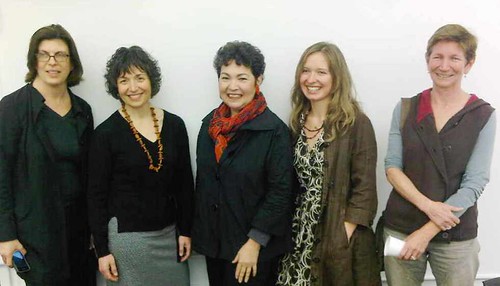
What inspired you to choose a career in chocolate?
Alice attributed luck or serendipity that after she had tasted chocolate in France she returned to Berkeley during the Gourmet Chetto’s heydey, first selling her chocolate truffles at the Pig by the Tail charcuterie. “I’m the queen of ignorance is bliss,” she explained as the secret to her success.
Kathy always knew she wanted a business and that it would be food. She quit her Information Technology job and spent six months pondering. She then started cooking around at different places and in 2005 opened up the business, with an intention of making confections with a savory bent.
Penny started as a painter and art history teacher, which is not the usual path to starting a multi-million dollar search engine company (Ask Jeeves). But she does not have the usual life M.O.: While on vacation in Provence, she turned to her kids and said “I’m going to start a chocolate company.” They held her to it. “Seven years later here we are. I love the constant learning and making good chocolate approachable.”
Thalia has had a life-long fascination with sciences and food. “At age 3 I started making pies out of mud and was always frustrated I couldn’t eat it.” She was always attracted to sciences and wanted to know what all the additives – like sodium bicarbonate – were in food. (Of course that was baking soda.)
Her childhood fascination with discovering the mysteries of food led her to get a BS from UC Davis in food biochemistry. She first landed a job at a company pioneering those carob and yogurt coated snacks, back when they were new to the market. A few years later, the Guittard family, whose Bay Area chocolate company dates back to the 1800s, hired her. 28 years later…
Zohara grew up in Berkeley, with food in her blood. Her Mom took her to Alice Medrich’s Cocolat as a young girl. The sensory aspect of chocolate combined with world connections spoke to her. She took a chocolate technology course where Thalia was one of the teachers. Then she started using space after hours at Bittersweet (see the connections?) to make truffles to sell at Oakland’s temescal farmer’s market.
She knew some of TCHO’s founders and began using their facility. She started helping them and liked the idea of how their business could have a global impact.
“I heard many of you use the words ‘blessed” and ‘luck’ but I know you’re really very hard working,” David observed.
What’s a typical day like?
The common answer across all roles spanned planning and reacting to broken equipment, sales, conference calls with worldwide growers and associations. For Alice, who is largely writing cookbooks, her days alternate between making food, testing recipes, and writing – a happy balance.
What skills do you recommend for working in bean-to-bar chocolate?
“None of us went to chocolate school. We were all self starters and learned.”
“Lots of prayer and meditation,” Thalia commented. Plus a good work ethic, be mechanically inclined, and have an appreciation for design with the urge to make and solve problems in the creative sense.
“You need a huge understanding that things may not turn out the 1st, 10th, or 20th time,” Alice commented. “There are endless iterations. People who say they’re starting a business who want all the answers probably wont’ do it. You need to jump in and learn. Take the leap.”
Kathy added that you need perseverence. “You’ve got to just go out and do it. If you really love what you’re doing it will keep you going.”
Penelope observed “if you keep saying ‘what if’ you won’t do it. You have to put your fears aside.”
The ability to taste lots and lots of chocolate is required; it’s not quite as pleasant as it sounds as you read this with no chocolate on hand.
Although there’s always the chance you may have an experience like Thalia described of” some Trinidad beans that “took me from the physical to the metaphysical.” (Sounds nutriceutical to me!) 😉
How do you taste and describe chocolate?
“The psychoactive properties of flavors…the broad palate of chocolate is infinite.” Thalia noted. “The more like a kid I can be the more honest I can be about it like I taste this then it drops off. I don’t often use the words you see in the media.” She mnight use “freshly poured concrete, cement, floral” Better yet is the 6 point rating scale: yum, yum yum, yum yum yum, yuck, yuck yuck, yuck yuck, yuck. Without a middle point so you can’t be wishy washy.”
Alice sometimes uses words like harmony. There aren’t specific words, and they usually aren’t the kind you see in consumer magazines. She pointed out that a descriptive word isn’t a necessary positive or negative like “bitter or “tart,” words that don’t clarify if a taste is good or bad.
As an aside, she pointed out “Chocolate has earthy flavors. You can put much less sugar with better tasting beans.”
What’s the best way to turn your passion into a business?
Kathy suggests sitting down and being real about the skills you have and if you need other skills or people to complement you.
Penny suggests collaborating with other chocolate makers, and similiarly Zohara emphasized connecting.
Thalia says “It’s a tight knit community. We all speak chocolate. Join us! For the most part I’ve found it incredibly supportive. The World Cocoa Foundation is like the Star Trek Federation,” (with a chuckle). “Be ready to contribute. Discover what you’d like to contribute.”
And the answer to question #1, on why most bean to bar makers are men?
Gadget hounds! Massive machinery, tinkering. The entire panel was in consensus. It’s not the chemical and physical nature of making the chocolate but the machinery it takes. (In fact, I know a couple who makes bean to bar chocolate and indeed the husband built the machinery and the wife leads the chocolate making.)
The discussion ended with much applause and no chocolate, although I felt vicariously elated from this lively discussion among these passionate women who have shaped the cacao bean into so many chocolate art forms.
Inspired? Have a story to share?

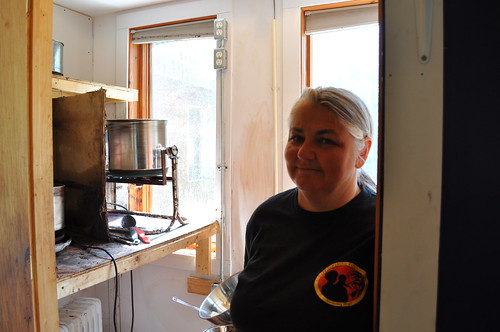


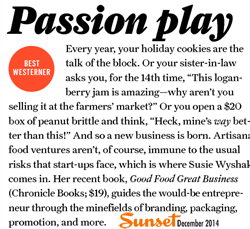

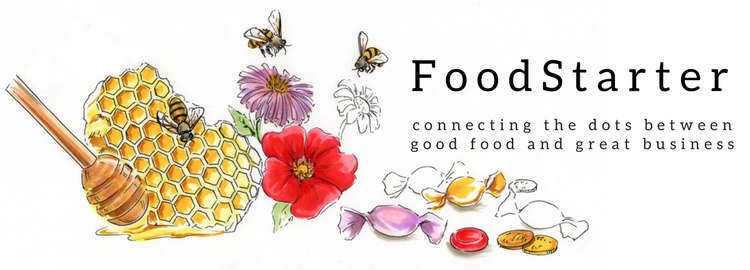
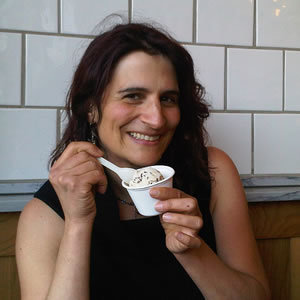
[…] This post was mentioned on Twitter by Good Food Awards, Susie Wyshak. Susie Wyshak said: Notes on Careers for Women in #Chocolate w/ 5 Industry Luminaries http://t.co/uMhJ8rq @goodfoodjobs @goodfoodawards […]